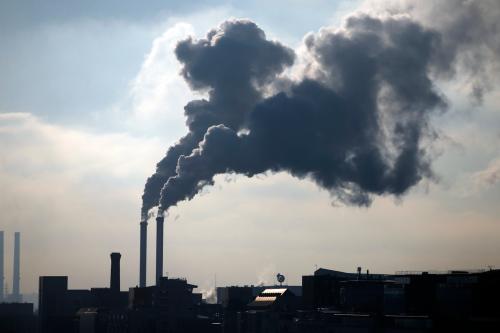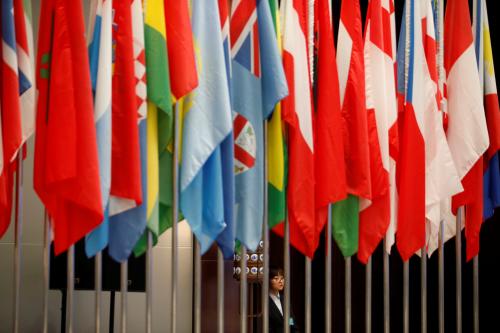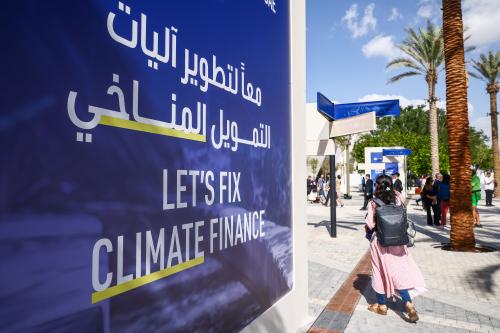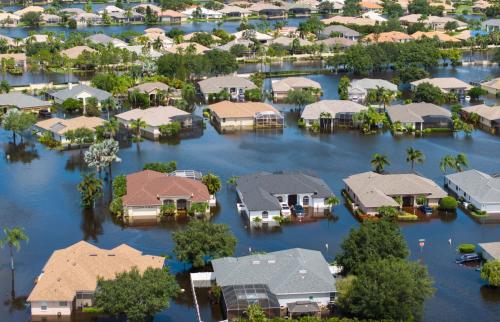In the lead-up to the COP24 climate talks in Poland and in the wake of a major new report from the Intergovernmental Panel on Climate Change, Brookings hosted Rachel Kyte, CEO of Sustainable Energy for All (SEforALL) on November 19. She is also the special representative of the U.N. secretary-general for Sustainable Energy for All and a professor at the Fletcher School of Law and Diplomacy at Tufts University. Kyte engaged in conversation with Co-Chair of the Cross-Brookings Initiative on Energy and Climate David G. Victor, following introductory remarks by Foreign Policy Vice President and Director Bruce Jones.
Energy access and energy transitions in a climate-constrained future
Kyte discussed two conflicting goals: providing modern energy services to large populations of the globe that don’t have it and transitioning to lower-carbon economies. This tension occurs amid ongoing conversations about the future of the Paris Agreement and the United Nation’s Sustainable Development Goals, as well as amid increasing warnings from the scientific community on the rising impacts of climate change.
She highlighted the need for additional progress in energy transitions in major carbon-emitting sectors like steel and industry, and in transportation. Kyte also highlighted the need for more technological innovation in energy systems, emerging technology, and decentralized energy systems like microgrids.
https://www.youtube.com/watch?v=9oD7qgByPl8?start=515&end=562
The financing gap to meet energy access needs
A recent SE4ALL report highlighted that there remains a major finance gap—amounting to billions of dollars—impeding efforts to help provide modern energy services access (including clean cooking fuels) to the world’s poorest communities.
At the COP 24 meeting in Katowice, Poland, financing will be an essential topic of discussion. How can financing be leveraged toward the Paris goals, the Sustainable Development goals, and to meeting energy access needs? These questions are critical now, Kyte emphasized.
https://www.youtube.com/watch?v=9oD7qgByPl8?start=1047&end=1112
Equity and human rights dimensions of energy transitions
Amid dire warnings about the rising impacts of climate change—including rising global temperatures, sea level rise, increased vulnerability of certain regions and populations—Kyte emphasized the need to focus on equity dimensions of energy access and sustainable development.
She argued that actors working in this space should prioritize providing energy access to the world’s poorest people; meeting the needs of developing countries (not only the priorities of advanced economies), including in sub-Saharan African countries and other emerging economies; considering the world’s poor in devising energy access and solutions; and understanding the human dimensions of energy transitions in emerging economies, such as for women and other at-risk populations.
https://www.youtube.com/watch?v=9oD7qgByPl8?start=581&end=607
The role of America in climate change discussions
David Victor asked Kyte whether America is entirely absent from the discussions surrounding sustainable energy development. She was quick to say that there are Americans involved in the conversation at every level. However, the climate change deniers in the current administration have created a global understanding of two different Americas, one that is interested in sustainable development, and one that is not. Global players, Kyte said, wish to have American buy-in and will welcome America back to the multilateral conversation when the U.S. is ready.
https://www.youtube.com/watch?v=9oD7qgByPl8?start=4262&end=4373
This event was the third in a series of conversations at Brookings with leaders from industry, international organizations, and academia to highlight important energy and climate challenges. You can learn more about previous events in the series here and here.
Mary Bernard contributed to this post.
The Brookings Institution is committed to quality, independence, and impact.
We are supported by a diverse array of funders. In line with our values and policies, each Brookings publication represents the sole views of its author(s).







Commentary
Highlights: The new dynamics of global energy and climate
November 29, 2018